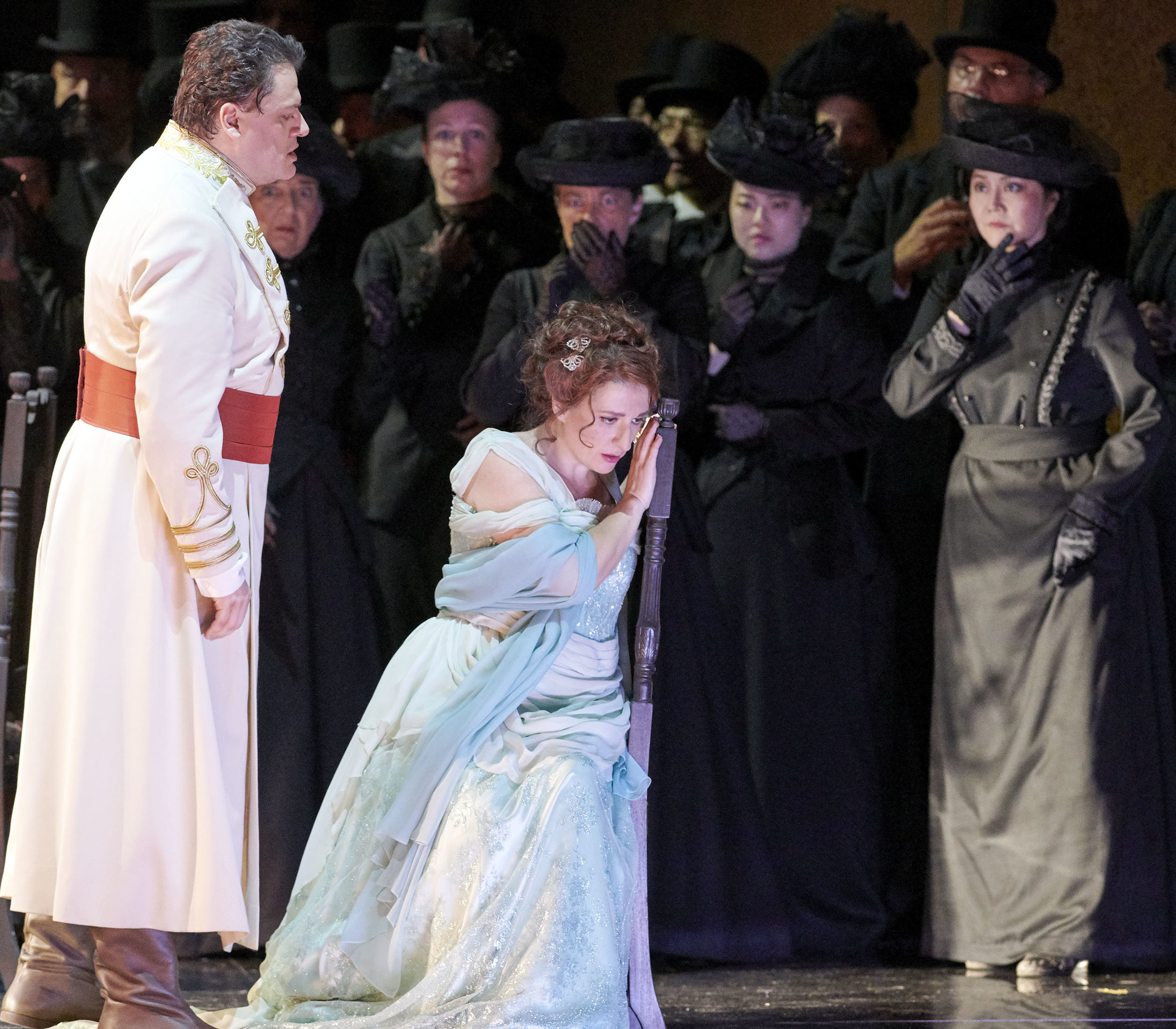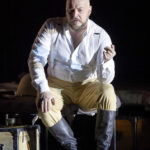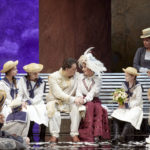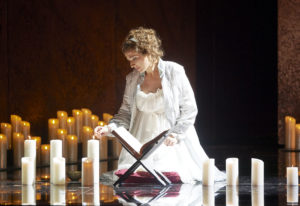 Tonight’s performance nearly didn’t happen. Olga Bezsmertna (Desdemona) had to cancel – ‘no voice’- and Elena Guseva (who’d sung Aida last night), on the way to her plane, had to turn back (MD Dominique Meyer explained.) Misgivings allayed, her performance was a miracle: even if she’d sung it before, there’s the chemistry with Otello (Aleksandrs Antonenko.)
Tonight’s performance nearly didn’t happen. Olga Bezsmertna (Desdemona) had to cancel – ‘no voice’- and Elena Guseva (who’d sung Aida last night), on the way to her plane, had to turn back (MD Dominique Meyer explained.) Misgivings allayed, her performance was a miracle: even if she’d sung it before, there’s the chemistry with Otello (Aleksandrs Antonenko.)
In their duet ending Act 1, the dark night quenches every sound, Guseva, radiates joy, unaffected, her lyric soprano exuding warmth and sincerity. In her simple faith, she’s a ‘harbour of comfort’ to Otello. Antonenko’s expressive, radiant tenor, sings of his raging heart soothed in her arms: how many hardships preceded their great love. She, you told me of your life, your great pains, his adventures at sea, the suffering slaves: he loved her for her compassion. In her white silk dress, she’s angel-like. His bliss is so great, he fears it may not last. They retreat, their symmetry is wondrous. This great love – unworldly, too perfect- is what Jago – out of malice, jealousy- plots to undermine.
The omens are bad, Otello’s returning in a violent storm ‘whipping up the ocean’. Chorus, late 19th century dress, Verdi’s time – sing of a ‘universe in chaos’: portents of the unnatural in Shakespeare, affecting human behaviour. Sensational, Vienna State Opera (and extra) choruses.
In the welcoming party in a tavern, Jago (Vladisav Sulimsky) boasts,’foolish the man who dies for a woman’; and ominously, if I were the Moor, I would be on my guard against Jago. Jago, Sulimsky in long-sleeved vest, man of the people, tankard in hand, plies Cassio with beer. Jago’s scheme to instigate a fight between Roderigo and Cassio, so getting drunken Cassio demoted by a furious Otello. (It’s a revenge thing, Cassio was promoted over Jago.) Cassio (superb tenor Jinxu Xiahou) is the innocent fall-guy in Jago’s conspiracy. Cassio sings of his wife as the flower of the island: above praise. Yet later he’s made to appear to Otello as if he’s having an affair with Desdemona.
 Sulimsky’s Jago is masterful, although it’s argued, Verdi and librettist Boito’s Jago is darker, more evil, more ‘opera-friendly’ (than Shakespeare’s). Sulimsky’s supple baritone- powerful, virile – excels in the Credo, to portray this negative, if evil, flamboyant personality. Credo in dio crude, he sings, he’s driven by his demons, believes in a cruel God, who created him in his image. He was born wretched. A villain because he’s a man. But he’ll turn evil to his advantage. Death’s a void, heaven a myth.
Sulimsky’s Jago is masterful, although it’s argued, Verdi and librettist Boito’s Jago is darker, more evil, more ‘opera-friendly’ (than Shakespeare’s). Sulimsky’s supple baritone- powerful, virile – excels in the Credo, to portray this negative, if evil, flamboyant personality. Credo in dio crude, he sings, he’s driven by his demons, believes in a cruel God, who created him in his image. He was born wretched. A villain because he’s a man. But he’ll turn evil to his advantage. Death’s a void, heaven a myth.
Verdi developed on Shakespeare’s psychological study in jealousy, Otello increasingly susceptible to Jago’s insinuations. So when Cassio goes to see Desdemona (hoping she’ll intercede on his behalf), Jago inflames Otello’s jealousy, with Otello observing the two only from a distance. Was that Cassio with my wife? Did Cassio know Desdemona before you were married?- He often carried letters.- Do you think he’s honest? – Beware my lord of jealousy! Jago’s warning is sung with disturbing ambivalence. My breast is a gaping wound, sings Otello: ‘love and jealousy shall fade together.”An honest soul often fails to see deception’, is Jago’s advice to Otello, ironic also in applying to Desdemona.
Adrian Noble’s production- compared to Mielitz’s previous, brutalist concept- is subliminal, richly sensuous in its colour palette (stage Dick Bird). We see Desdemona on a park bench, children – in cute sailors outfits – at her feet. The charming scene – brilliantly lit, bright daylight – contrasts to the rather sombre, oppressive mood. It isn’t kitsch, it rather shows Desdemona child-like innocence: (See no evil).  So she is constantly speaking for Cassio, blithely unaware she’s provoking her husband, confirming his suspicions. ‘He deserves your mercy. Intercede for him.’ She sees Otello’s temples are throbbing: this handkerchief will cool you. She didn’t realise she’s caused him pain.
So she is constantly speaking for Cassio, blithely unaware she’s provoking her husband, confirming his suspicions. ‘He deserves your mercy. Intercede for him.’ She sees Otello’s temples are throbbing: this handkerchief will cool you. She didn’t realise she’s caused him pain.
On the other bench, Jago asks Emilia (Margareta Gritskova) for the handkerchief she’s borrowed from her mistress Desdemona. He grabs it.’ I am your wife not your slave.’ – ‘You are Jago’s slave’, he pushes her.
In one of Verdi’s masterly ensemble, characters’ voices intermingle: Desdemona fears her golden dreams reduced to dust; Antonenko bemoans the end of his glory. Otello demands proof of Cassio’s adultery. So Jago relates of ‘Cassio’s dream of heavenly bliss’, he’d ‘overheard’. Sulimsky sings with tenderness, as if Jago’s own sexual fantasy. The stage is strewn with white spring blossoms.
Opening Act 3, the stage – consists of two long tables-like a political inquisition. Jago invites Cassio over to answer questions. So, Otello, hidden, is made to hear incriminating snippets. Cassio is singing about his wife, but unwittingly holding Desdemona’s handkerchief.
In one of the most harrowing scenes- powerfully enacted and naturalistic- Otello interrogates his wife. Give me your hand, he orders her; ‘thus the demon of temptation works’.- She, and with this same hand she gave her heart to him! But incredibly, she mentions Cassio- ‘Let us speak once more of Cassio- while Otello’s on about the handkerchief. Woe betide you if you’ve lost it! She thinks he’s playing a game (to distract from Cassio.) Forgive him! He almost strangles her; pushes her over to the wall, violently turns her around. She’s terrified. Look at me! she sings, her tears sprinkle the ground at his feet. God can see I am faithful. (He weeps too.)- ‘What is her crime?’- She’s a common whore. She, distraught, covers her face. ‘Give me your pretty hand!’ Then he forces her arm behind her back. Antonenko sings, powerful range heartfelt, in Otello’s haunting aria, robbed of the illusion that nourished his soul.
Otello descends into madness, with the visit of Ludovico (Jongmin Park) the Venetian ambassador.( Otello’s recalled to Venice, and Cassio promoted.) Desdemona’s untimely ‘You know how much I care for Cassio’, pushes Otello over the edge. He hurls her, ‘To the ground and weep!’ She has to show remorse for his humiliation. The shudder of her dying spirit chills her, she sings. She is innocent, the Chorus sing, yet she shows no hatred. Otello ‘possessed of some demon’, writhes on the floor, sings ‘my passion takes effect’.
The role of Desdemona is ideally a young woman with a ‘mature soprano: able to switch from powerful high notes to gentle pain-filled phrases’ (Erich Seitter). In Desdemona’s last scenes, Guseva gives a lifetime performance. All the more remarkable at such short notice.
 An oboe solo sets the tone, melancholy, soulful. The marital bed, with elaborate, red oriental motifs, dominates the stage. The candles lit on either side, remind us of Desdemona’s religious faith. If she should die… She sings to Emilia about her mother’s maid called Barbara, who sang the Song of the Willow (Le Canzon del salice.) She wept such bitter tears. Always ended, he was born for glory, I was born for love. And to love him and to die. Cruelly ironic, Desdemona’s own fate. Poignantly sung by Guseva with simple elegance. The stylised Willow Song leads into Ave Maria. Guseva’s rendition, heart-felt, eschewed any sentimentality. Pray for the sinner, the innocent, those abused. Not a sound to be heard in that vast auditorium. (I wasn’t the only one fighting back the tears.)
An oboe solo sets the tone, melancholy, soulful. The marital bed, with elaborate, red oriental motifs, dominates the stage. The candles lit on either side, remind us of Desdemona’s religious faith. If she should die… She sings to Emilia about her mother’s maid called Barbara, who sang the Song of the Willow (Le Canzon del salice.) She wept such bitter tears. Always ended, he was born for glory, I was born for love. And to love him and to die. Cruelly ironic, Desdemona’s own fate. Poignantly sung by Guseva with simple elegance. The stylised Willow Song leads into Ave Maria. Guseva’s rendition, heart-felt, eschewed any sentimentality. Pray for the sinner, the innocent, those abused. Not a sound to be heard in that vast auditorium. (I wasn’t the only one fighting back the tears.)
No time for applause. Deep tubas, thunderous brass, then trumpets, announce Otello’s entrance. Have you said your prayers tonight? My song is love, she protests. And for that you die! Otello lies alongside his sleeping wife; awakens her, and still accuses her of being Cassio’s whore. She, desperately- Pray for me- pleading her innocence. (They struggle under a bulging tent of white silk.) Antonenko, in his long white robe- after hearing from Emilia about the deception- calmly stabs himself, and passionately kissing Desdemona’s corpse, bids her farewell.
The dramatic and vocal synthesis of the principals, Antoneko and Guseva, was nothing less than miraculous. Thanks in no small measure to Myung-Whun Chung’s exceptionally sympathetic conducting of Vienna State Opera Orchestra and Choruses.© PR 30.6.2019
Photos: Aleksandrs Antonenko (Otello), Olga Bezsmertna (Desdemona); Vladislav Sulimsky (Jago); Aleksandrs Antonenko, Olga Bezsmertna, Margarita Gritskova (Emilia), Wiener Staatsoper Opera School; Olga Bezsmertna (Desdemona). Regrettably, no photos of Elena Guseva as Desdemona were available, as she replaced Bezsmertna, as explained, at very short notice.
© Wiener Staatsoper/ Michael Pöhn
viennaoperareview.com
Vienna's English opera blog
